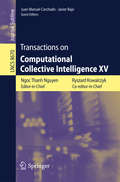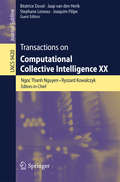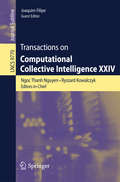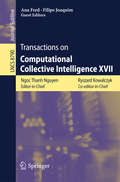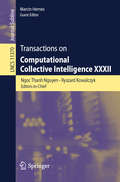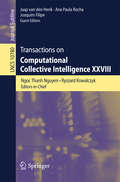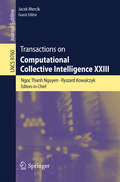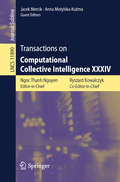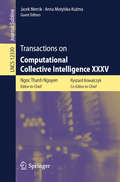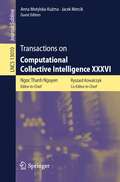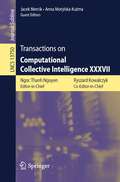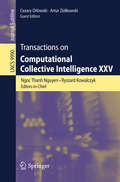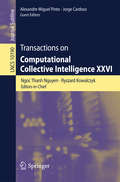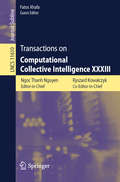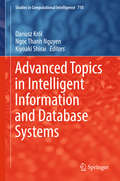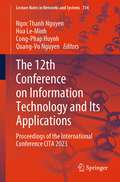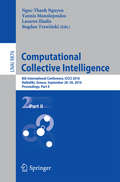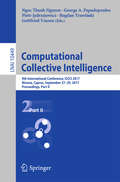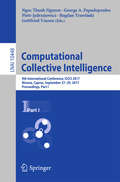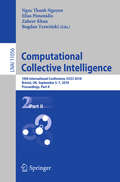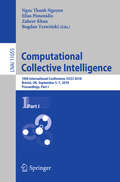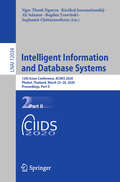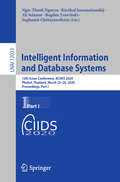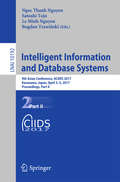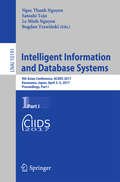- Table View
- List View
Transactions on Computational Collective Intelligence XV
by Ngoc Thanh Nguyen Ryszard Kowalczyk Juan Manuel Corchado Javier BajoThese transactions publish research in computer-based methods of computational collective intelligence (CCI) and their applications in a wide range of fields such as the Semantic Web, social networks, and multi-agent systems. TCCI strives to cover new methodological, theoretical and practical aspects of CCI understood as the form of intelligence that emerges from the collaboration and competition of many individuals (artificial and/or natural). The application of multiple computational intelligence technologies, such as fuzzy systems, evolutionary computation, neural systems, consensus theory, etc. , aims to support human and other collective intelligence and to create new forms of CCI in natural and/or artificial systems. This 15th issue contains extended and revised versions of the best papers presented at the International Conference on Practical Applications on Agents and Multi-Agent Systems (PAAMS 2012 and PAAMS 2013) held in Salamanca, Spain.
Transactions on Computational Collective Intelligence XX
by Ngoc Thanh Nguyen Ryszard Kowalczyk Béatrice Duval Jaap van den Herik Stephane Loiseau Joaquim FilipeThese transactions publishresearch in computer-based methods of computational collective intelligence(CCI) and their applications in a wide range of fields such as the semanticWeb, social networks, and multi-agent systems. TCCI strives to cover newmethodological, theoretical and practical aspects of CCI understood as the formof intelligence that emerges from the collaboration and competition of manyindividuals (artificial and/or natural). The application of multiplecomputational intelligence technologies, such as fuzzy systems, evolutionarycomputation, neural systems, consensus theory, etc. , aims to support human andother collective intelligence and to create new forms of CCI in natural and/orartificial systems. This twentieth issue contains 11 carefully selected andrevised contributions.
Transactions on Computational Collective Intelligence XXIV
by Ngoc Thanh Nguyen Ryszard Kowalczyk Joaquim FilipeThese transactions publish research in computer-based methods of computational collective intelligence (CCI) and their applications in a wide range of fields such as the semantic Web, social networks, and multi-agent systems. TCCI strives to cover new methodological, theoretical and practical aspects of CCI understood as the form of intelligence that emerges from the collaboration and competition of many individuals (artificial and/or natural). The application of multiple computational intelligence technologies, such as fuzzy systems, evolutionary computation, neural systems, consensus theory, etc. , aims to support human and other collective intelligence and to create new forms of CCI in natural and/or artificial systems. This twenty-forth issue contains 9 carefully selected and revised contributions. p>
Transactions on Computational Collective Intelligence XVII
by Ngoc Thanh Nguyen Ryszard Kowalczyk Ana Fred Filipe JoaquimThese transactions publish research in computer-based methods of computational collective intelligence (CCI) and their applications in a wide range of fields such as the semantic Web, social networks, and multi-agent systems. TCCI strives to cover new methodological, theoretical and practical aspects of CCI understood as the form of intelligence that emerges from the collaboration and competition of many individuals (artificial and/or natural). The application of multiple computational intelligence technologies, such as fuzzy systems, evolutionary computation, neural systems, consensus theory, etc. , aims to support human and other collective intelligence and to create new forms of CCI in natural and/or artificial systems.
Transactions on Computational Collective Intelligence XXXII (Lecture Notes in Computer Science #11370)
by Ngoc Thanh Nguyen Ryszard Kowalczyk Marcin HernesThese transactions publish research in computer-based methods of computational collective intelligence (CCI) and their applications in a wide range of fields such as the semantic web, social networks, and multi-agent systems. TCCI strives to cover new methodological, theoretical and practical aspects of CCI understood as the form of intelligence that emerges from the collaboration and competition of many individuals (artificial and/or natural). The application of multiple computational intelligence technologies, such as fuzzy systems, evolutionary computation, neural systems, consensus theory, etc., aims to support human and other collective intelligence and to create new forms of CCI in natural and/or artificial systems. This thirty-second issue presents 5 selected papers in the field of management, economics and computer science.
Transactions on Computational Collective Intelligence XXVIII
by Ngoc Thanh Nguyen Ryszard Kowalczyk Jaap van den Herik Ana Paula Rocha Joaquim FilipeThese transactions publish research in computer-based methods of computational collective intelligence (CCI) and their applications in a wide range of fields such as the semantic Web, social networks, and multi-agent systems. TCCI strives to cover new methodological, theoretical and practical aspects of CCI understood as the form of intelligence that emerges from the collaboration and competition of many individuals (artificial and/or natural). The application of multiple computational intelligence technologies, such as fuzzy systems, evolutionary computation, neural systems, consensus theory, etc., aims to support human and other collective intelligence and to create new forms of CCI in natural and/or artificial systems. This twenty-eight issue is a special issue with 11 selected papers from the International Conference on Agents and Artificial Intelligence, ICAART 2016 and 2017 editions.
Transactions on Computational Collective Intelligence XXIII
by Ngoc Thanh Nguyen Ryszard Kowalczyk Jacek MercikThese transactions publish research in computer-based methods of computational collective intelligence (CCI) and their applications in a wide range of fields such as the semantic Web, social networks, and multi-agent systems. TCCI strives to cover new methodological, theoretical and practical aspects of CCI understood as the form of intelligence that emerges from the collaboration and competition of many individuals (artificial and/or natural). The application of multiple computational intelligence technologies, such as fuzzy systems, evolutionary computation, neural systems, consensus theory, etc. , aims to support human and other collective intelligence and to create new forms of CCI in natural and/or artificial systems. This twenty-third issue contains 14 carefully selected and revised contributions.
Transactions on Computational Collective Intelligence XXXIV (Lecture Notes in Computer Science #11890)
by Ngoc Thanh Nguyen Ryszard Kowalczyk Jacek Mercik Anna Motylska-KuźmaThese transactions publish research in computer-based methods of computational collective intelligence (CCI) and their applications in a wide range of fields such as performance optimization in IoT, big data, reliability, privacy, security, service selection, QoS and machine learning. This thirty-fourth issue contains 12 selected papers which present new findings and innovative methodologies as well as discuss issues and challenges in the field of collective intelligence in group decision making with special emphasize given to voting theory, power indices and graphs while addressing elections, social choices, IoT and allocation algorithms.
Transactions on Computational Collective Intelligence XXXV (Lecture Notes in Computer Science #12330)
by Ngoc Thanh Nguyen Ryszard Kowalczyk Jacek Mercik Anna Motylska-KuźmaThese transactions publish research in computer-based methods of computational collective intelligence (CCI) and their applications in a wide range of fields such as performance optimization in IoT, big data, reliability, privacy, security, service selection, QoS and machine learning. This thirty-fifth issue contains 10 selected papers which present new findings and innovative methodologies as well as discuss issues and challenges in the field of collective intelligence from big data and networking paradigms while addressing security, privacy, reliability and optimality to achieve QoS to the benefit of final users.
Transactions on Computational Collective Intelligence XXXVI (Lecture Notes in Computer Science #13010)
by Ngoc Thanh Nguyen Ryszard Kowalczyk Jacek Mercik Anna Motylska-KuźmaThese transactions publish research in computer-based methods of computational collective intelligence (CCI) and their applications in a wide range of fields such as performance optimization in IoT, big data, reliability, privacy, security, service selection, QoS and machine learning. This 36th issue contains 7 selected papers which present new findings and innovative methodologies as well as discuss issues and challenges in the field of collective intelligence from big data and networking paradigms while addressing security, privacy, reliability and optimality to achieve QoS to the benefit of final users
Transactions on Computational Collective Intelligence XXXVII (Lecture Notes in Computer Science #13750)
by Ngoc Thanh Nguyen Ryszard Kowalczyk Jacek Mercik Anna Motylska-KuźmaThese transactions publish research in computer-based methods of computational collective intelligence (CCI) and their applications in a wide range of fields such as performance optimization in IoT, big data, reliability, privacy, security, service selection, QoS and machine learning. This 37th issue contains 9 selected papers which present new findings and innovative methodologies as well as discuss issues and challenges in the field of collective intelligence from big data and networking paradigms while addressing security, privacy, reliability and optimality to achieve QoS to the benefit of final users.
Transactions on Computational Collective Intelligence XXV
by Ngoc Thanh Nguyen Ryszard Kowalczyk Cezary Orlowski Artur ZiółkowskiThese transactions publish research in computer-based methods of computational collective intelligence (CCI) and their applications in a wide range of fields such as the semantic Web, social networks, and multi-agent systems. TCCI strives to cover new methodological, theoretical and practical aspects of CCI understood as the form of intelligence that emerges from the collaboration and competition of many individuals (artificial and/or natural). The application of multiple computational intelligence technologies, such as fuzzy systems, evolutionary computation, neural systems, consensus theory, etc. , aims to support human and other collective intelligence and to create new forms of CCI in natural and/or artificial systems. This twenty-fifth issue contains 8 carefully selected and revised contributions.
Transactions on Computational Collective Intelligence XXVI
by Ngoc Thanh Nguyen Ryszard Kowalczyk Alexandre Miguel Pinto Jorge CardosoThese transactions publish research in computer-based methods of computational collective intelligence (CCI) and their applications in a wide range of fields such as the semantic Web, social networks, and multi-agent systems. TCCI strives to cover new methodological, theoretical and practical aspects of CCI understood as the form of intelligence that emerges from the collaboration and competition of many individuals (artificial and/or natural). The application of multiple computational intelligence technologies, such as fuzzy systems, evolutionary computation, neural systems, consensus theory, etc. , aims to support human and other collective intelligence and to create new forms of CCI in natural and/or artificial systems. This twenty-sixth issue is a special issue with selected papers from the First International KEYSTONE Conference 2015 (IKC 2015), part of the keystone COST Action IC1302.
Transactions on Computational Collective Intelligence XXXIII (Lecture Notes in Computer Science #11610)
by Ngoc Thanh Nguyen Ryszard Kowalczyk Fatos XhafaThese transactions publish research in computer-based methods of computational collective intelligence (CCI) and their applications in a wide range of fields such as performance optimization in IoT, big data, reliability, privacy, security, service selection, QoS and machine learning. This thirty-third issue contains 9 selected papers which present new findings and innovative methodologies as well as discuss issues and challenges in the field of collective intelligence from big data and networking paradigms while addressing security, privacy, reliability and optimality to achieve QoS to the benefit of final users.
Advanced Topics in Intelligent Information and Database Systems (Studies in Computational Intelligence #710)
by Ngoc Thanh Nguyen Dariusz Król Kiyoaki ShiraiThis book presents recent research in intelligent information and database systems. The carefully selected contributions were initially accepted for presentation as posters at the 9th Asian Conference on Intelligent Information and Database Systems (ACIIDS 2017) held from to 5 April 2017 in Kanazawa, Japan. While the contributions are of an advanced scientific level, several are accessible for non-expert readers. The book brings together 47 chapters divided into six main parts: * Part I. From Machine Learning to Data Mining. * Part II. Big Data and Collaborative Decision Support Systems, * Part III. Computer Vision Analysis, Detection, Tracking and Recognition, * Part IV. Data-Intensive Text Processing, * Part V. Innovations in Web and Internet Technologies, and * Part VI. New Methods and Applications in Information and Software Engineering. The book is an excellent resource for researchers and those working in algorithmics, artificial and computational intelligence, collaborative systems, decision management and support systems, natural language processing, image and text processing, Internet technologies, and information and software engineering, as well as for students interested in such research areas.
The 12th Conference on Information Technology and Its Applications: Proceedings of the International Conference CITA 2023 (Lecture Notes in Networks and Systems #734)
by Ngoc Thanh Nguyen Hoa Le-Minh Cong-Phap Huynh Quang-Vu NguyenThis book constitutes the refereed proceedings of the 12th Conference on Information Technology and its Applications, CITA 2023, taking place on July 28-29, 2023 in Da Nang City, the most beautiful and livable city in Vietnam. CITA is an annual scientific conference on information technology and its applications in all fields. The main objective of the conference is to create a forum to gather and connect Vietnamese and international researchers, scientists in the fields of information technology and its applications. The book includes 33 papers, selected from 144 papers submitted to CITA 2023 whose authors come from over 20 countries around the world, which were carefully reviewed by at least two members of the Program Committee, with professional advice from reputable scientists in the field of information technology and technology, digital economy such as Prof. Dr.Sc. Ngoc-Thanh Nguyen (Poland), Prof. Dr. Dosam Hwang (Korea), Assoc. Prof. Dr. Le Minh Hoa (UK), and Prof.Dr. Nguyen Thanh Thuy (Vietnam). The acceptance rate of CITA 2023 is about 24%. The papers in the book are organized in the following topical sections: Data Science and Artificial Intelligence; Image and Natural Language Processing; Software Engineering and Information Systems; Network and Communications; and Digital Economy. The accepted and presented papers focus on new trends and challenges facing the information and communication technology as well as digital economy community. If you are scientists, lecturers, doctoral students, we hope that you will find many useful and good quality results from the book for your future research.
Computational Collective Intelligence: 8th International Conference, ICCCI 2016, Halkidiki, Greece, September 28-30, 2016. Proceedings, Part II (Lecture Notes in Computer Science #9876)
by Ngoc Thanh Nguyen Yannis Manolopoulos Lazaros Iliadis Bogdan TrawińskiCollective intelligence has become one of major research issues studied by today's and future computer science. Computational collective intelligence is understood as this form of group intellectual activity that emerges from collaboration and compe- tion of many artificial individuals. Robotics, artificial intelligence, artificial cognition and group working try to create efficient models for collective intelligence in which it emerges from sets of actions carried out by more or less intelligent individuals. The major methodological, theoretical and practical aspects underlying computational collective intelligence are group decision making, collective action coordination, collective competition and knowledge description, transfer and integration. Obviously, the application of multiple computational technologies such as fuzzy systems, evo- tionary computation, neural systems, consensus theory, knowledge representation etc. is necessary to create new forms of computational collective intelligence and support existing ones. Three subfields of application of computational technologies to support forms of collective intelligence are of special attention to us. The first one is semantic web treated as an advanced tool that increases the collective intelligence in networking environments. The second one covers social networks modeling and analysis, where social networks are this area of in which various forms of computational collective intelligence emerges in a natural way. The third subfield relates us to agent and mul- agent systems understood as this computational and modeling paradigm which is especially tailored to capture the nature of computational collective intelligence in populations of autonomous individuals.
Computational Collective Intelligence: 9th International Conference, ICCCI 2017, Nicosia, Cyprus, September 27-29, 2017, Proceedings, Part II (Lecture Notes in Computer Science #10449)
by Ngoc Thanh Nguyen George A. Papadopoulos Piotr Jędrzejowicz Bogdan Trawiński Gottfried VossenThis two-volume set (LNAI 10448 and LNAI 10449) constitutes the refereed proceedings of the 9th International Conference on Collective Intelligence, ICCCI 2017, held in Nicosia, Cyprus, in September 2017. The 117 full papers presented were carefully reviewed and selected from 248 submissions. The conference focuseson the methodology and applications of computational collective intelligence, included: multi-agent systems, knowledge engineering and semantic web, social networks and recommender systems, text processing and information retrieval, data mining methods and applications, sensor networks and internet of things, decision support & control systems, and computer vision techniques.
Computational Collective Intelligence: 9th International Conference, ICCCI 2017, Nicosia, Cyprus, September 27-29, 2017, Proceedings, Part I (Lecture Notes in Computer Science #10448)
by Ngoc Thanh Nguyen George A. Papadopoulos Piotr Jędrzejowicz Bogdan Trawiński Gottfried VossenThis two-volume set (LNAI 10448 and LNAI 10449) constitutes the refereed proceedings of the 9th International Conference on Collective Intelligence, ICCCI 2017, held in Nicosia, Cyprus, in September 2017. The 117 full papers presented were carefully reviewed and selected from 248 submissions. The conference focuseson the methodology and applications of computational collective intelligence, included: multi-agent systems, knowledge engineering and semantic web, social networks and recommender systems, text processing and information retrieval, data mining methods and applications, sensor networks and internet of things, decision support & control systems, and computer vision techniques.
Computational Collective Intelligence: 10th International Conference, ICCCI 2018, Bristol, UK, September 5-7, 2018, Proceedings, Part II (Lecture Notes in Computer Science #11056)
by Ngoc Thanh Nguyen Elias Pimenidis Zaheer Khan Bogdan TrawińskiThis two-volume set (LNAI 11055 and LNAI 11056) constitutes the refereed proceedings of the 10th International Conference on Collective Intelligence, ICCCI 2018, held in Bristol, UK, in September 2018 The 98 full papers presented were carefully reviewed and selected from 240 submissions. The conference focuses on knowledge engineering and semantic web, social network analysis, recommendation methods and recommender systems, agents and multi-agent systems, text processing and information retrieval, data mining methods and applications, decision support and control systems, sensor networks and internet of things, as well as computer vision techniques.
Computational Collective Intelligence: 10th International Conference, ICCCI 2018, Bristol, UK, September 5-7, 2018, Proceedings, Part I (Lecture Notes in Computer Science #11055)
by Ngoc Thanh Nguyen Elias Pimenidis Zaheer Khan Bogdan TrawińskiThis two-volume set (LNAI 11055 and LNAI 11056) constitutes the refereed proceedings of the 10th International Conference on Collective Intelligence, ICCCI 2018, held in Bristol, UK, in September 2018 The 98 full papers presented were carefully reviewed and selected from 240 submissions. The conference focuses on knowledge engineering and semantic web, social network analysis, recommendation methods and recommender systems, agents and multi-agent systems, text processing and information retrieval, data mining methods and applications, decision support and control systems, sensor networks and internet of things, as well as computer vision techniques.
Intelligent Information and Database Systems: 12th Asian Conference, ACIIDS 2020, Phuket, Thailand, March 23–26, 2020, Proceedings, Part II (Lecture Notes in Computer Science #12034)
by Ngoc Thanh Nguyen Ali Selamat Bogdan Trawiński Suphamit Chittayasothorn Kietikul JearanaitanakijThe two-volume set LNAI 12033 and 11034 constitutes the refereed proceedings of the 12th Asian Conference on Intelligent Information and Database Systems, ACIIDS 2020, held in Phuket, Thailand, in March 2020. The total of 105 full papers accepted for publication in these proceedings were carefully reviewed and selected from 285 submissions. The papers of the first volume are organized in the following topical sections: Knowledge Engineering and Semantic Web, Natural Language Processing, Decision Support and Control Systems, Computer Vision Techniques, Machine Learning and Data Mining, Deep Learning Models, Advanced Data Mining Techniques and Applications, Multiple Model Approach to Machine Learning. The papers of the second volume are divided into these topical sections: Application of Intelligent Methods to Constrained Problems, Automated Reasoning with Applications in Intelligent Systems, Current Trends in Arti cial Intelligence, Optimization, Learning,and Decision-Making in Bioinformatics and Bioengineering, Computer Vision and Intelligent Systems, Data Modelling and Processing for Industry 4.0, Intelligent Applications of Internet of Things and Data AnalysisTechnologies, Intelligent and Contextual Systems, Intelligent Systems and Algorithms in Information Sciences, Intelligent Supply Chains and e-Commerce, Privacy, Security and Trust in Arti cial Intelligence, Interactive Analysis of Image, Video and Motion Data in LifeSciences.
Intelligent Information and Database Systems: 12th Asian Conference, ACIIDS 2020, Phuket, Thailand, March 23–26, 2020, Proceedings, Part I (Lecture Notes in Computer Science #12033)
by Ngoc Thanh Nguyen Ali Selamat Bogdan Trawiński Suphamit Chittayasothorn Kietikul JearanaitanakijThe two-volume set LNAI 12033 and 11034 constitutes the refereed proceedings of the 12th Asian Conference on Intelligent Information and Database Systems, ACIIDS 2020, held in Phuket, Thailand, in March 2020. The total of 105 full papers accepted for publication in these proceedings were carefully reviewed and selected from 285 submissions. The papers of the first volume are organized in the following topical sections: Knowledge Engineering and Semantic Web, Natural Language Processing, Decision Support and Control Systems, Computer Vision Techniques, Machine Learning and Data Mining, Deep Learning Models, Advanced Data Mining Techniques and Applications, Multiple Model Approach to Machine Learning. The papers of the second volume are divided into these topical sections: Application of Intelligent Methods to Constrained Problems, Automated Reasoning with Applications in Intelligent Systems, Current Trends in Arti cial Intelligence, Optimization, Learning,and Decision-Making in Bioinformatics and Bioengineering, Computer Vision and Intelligent Systems, Data Modelling and Processing for Industry 4.0, Intelligent Applications of Internet of Things and Data AnalysisTechnologies, Intelligent and Contextual Systems, Intelligent Systems and Algorithms in Information Sciences, Intelligent Supply Chains and e-Commerce, Privacy, Security and Trust in Arti cial Intelligence, Interactive Analysis of Image, Video and Motion Data in LifeSciences.
Intelligent Information and Database Systems
by Ngoc Thanh Nguyen Satoshi Tojo Le Minh Nguyen Bogdan TrawińskiIntelligent information and database systems are two closely related and we- established subfields of modern computer science. They focus on the integration of artificial intelligence and classic database technologies in order to create the class of next generation information systems. The major target of this new gene- tion of systems is to provide end-users with intelligent behavior: simple and/or advanced learning, problem solving, uncertain and certain reasoning, se- organization, cooperation, etc. Such intelligent abilities are implemented in classic information systems to make them autonomous and user oriented, in particular when advanced problems of multimedia information and knowledge discovery, access, retrieval and manipulation are to be solved in the context of large, distr- uted and heterogeneous environments. It means that intelligent knowledge-based information and database systems are used to solve basic problems of large coll- tions management, carry out knowledge discovery from large data collections, reason about information under uncertain conditions, support users in their for- lation of complex queries etc. Topics discussed in this volume include but are not limited to the foundations and principles of data, information, and knowledge models, methodologies for intelligent information and database systems analysis, design, implementation, validation, maintenance and evolution.
Intelligent Information and Database Systems
by Ngoc Thanh Nguyen Satoshi Tojo Le Minh Nguyen Bogdan TrawińskiIntelligent information and database systems are two closely related and we- established subfields of modern computer science. They focus on the integration of artificial intelligence and classic database technologies in order to create the class of next generation information systems. The major target of this new gene- tion of systems is to provide end-users with intelligent behavior: simple and/or advanced learning, problem solving, uncertain and certain reasoning, se- organization, cooperation, etc. Such intelligent abilities are implemented in classic information systems to make them autonomous and user oriented, in particular when advanced problems of multimedia information and knowledge discovery, access, retrieval and manipulation are to be solved in the context of large, distr- uted and heterogeneous environments. It means that intelligent knowledge-based information and database systems are used to solve basic problems of large coll- tions management, carry out knowledge discovery from large data collections, reason about information under uncertain conditions, support users in their for- lation of complex queries etc. Topics discussed in this volume include but are not limited to the foundations and principles of data, information, and knowledge models, methodologies for intelligent information and database systems analysis, design, implementation, validation, maintenance and evolution.
